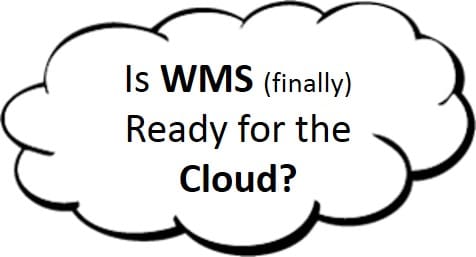 Oracle recently announced a definitive agreement to acquire Logfire, a Cloud WMS provider. Last year I explained that Cloud WMS deployments still remain limited compared to Cloud adoption of other supply chain software (I am using the term “Cloud” to represent single instance, multi-tenant solutions). And with good reason. WMS is a real-time application that requires quick response times to function properly. In addition, a WMS solution supports processes often confined to a single facility. In contrast, TMS and GTM solutions deliver much of their value by facilitating communications across organizations – a proceed well-suited for Cloud solutions. In full disclosure, I do consider myself to be one of the more hesitant analysts to jump on the “cloud” bandwagon. But I also believe that Cloud deployments will continue to displace the traditional on-premise, perpetual license model. I just think that hype has gotten far ahead of the value proposition in many instances. However, ARC’s research does show that Cloud deployments recently accelerated within the supply chain planning software market. And our research also shows that the WMS market is a bit of a final frontier for Cloud deployments. But Oracle’s recently announced acquisition of Logfire may signal an inflection point in the adoption of WMS in the Cloud. Here is why.
Oracle recently announced a definitive agreement to acquire Logfire, a Cloud WMS provider. Last year I explained that Cloud WMS deployments still remain limited compared to Cloud adoption of other supply chain software (I am using the term “Cloud” to represent single instance, multi-tenant solutions). And with good reason. WMS is a real-time application that requires quick response times to function properly. In addition, a WMS solution supports processes often confined to a single facility. In contrast, TMS and GTM solutions deliver much of their value by facilitating communications across organizations – a proceed well-suited for Cloud solutions. In full disclosure, I do consider myself to be one of the more hesitant analysts to jump on the “cloud” bandwagon. But I also believe that Cloud deployments will continue to displace the traditional on-premise, perpetual license model. I just think that hype has gotten far ahead of the value proposition in many instances. However, ARC’s research does show that Cloud deployments recently accelerated within the supply chain planning software market. And our research also shows that the WMS market is a bit of a final frontier for Cloud deployments. But Oracle’s recently announced acquisition of Logfire may signal an inflection point in the adoption of WMS in the Cloud. Here is why.
Large established enterprise software companies need growth, and smaller Cloud companies need economies of scale. It may be an obvious message, but it has never been truer. Cloud companies are growing rapidly, but off a small base. Meanwhile, large ERP vendors such as Oracle have been experiencing pricing pressure and slow organic growth rates. In the past it was sensible for Cloud solutions to exist and grow as separate entities from traditional software vendors. The scale of their operations was negligible compared to the established software business and start-ups don’t flourish in that type of environment. But the market has matured and the tide has shifted. Oracle, and other large ERP vendors such as Infor, are now committed to their Cloud offerings. They see the Cloud as a natural transition from their traditional perpetual licensing and maintenance business model. These companies also have economies of scale, large installed bases of customers, and a broad suite of solutions. All of these organizational characteristics can facilitate rapid adoption of a new product such as a Cloud offering.
From a WMS feature and functionality perspective, users have been slow to adopt WMS in the cloud due to internet latency concerns, scalability, breadth of functionality, and desire to have control over the solution. Although Logfire is a small company, its WMS is a functionally-rich multi-tenant solution that has been adopted by a number of large companies with complex requirements. The company claims to have tackled latency concerns and can support its position with customers that are integrating the solution with real-time warehouse automation. Finally, the Logfire solution is being added to Oracle’s SCM Cloud offering that has been a high profile project for Oracle. Therefore, the integration and ongoing development of Logfire’s applications will likely be an investment priority for Oracle going forward.
Final Word
WMS remains the final frontier for Cloud adoption of SCM software solutions. However, Oracle’s commitment to the Cloud and Logfire’s product design may just be the right combination to accelerate Oracle customers’ adoption of WMS in the Cloud and subsequently stimulate other WMS providers and their customers to follow suit.

















Leave a Reply